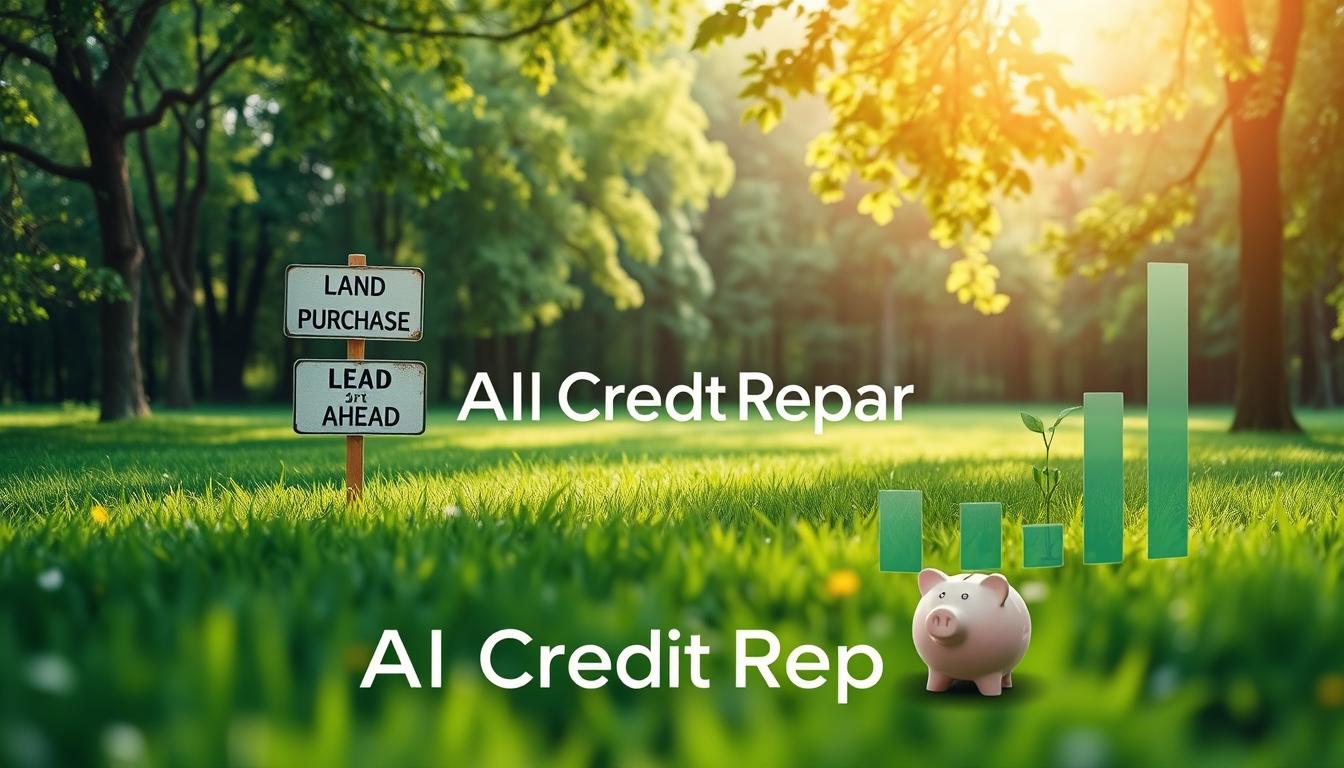Buying land is a big investment that needs careful financial planning. Understanding the required credit score is crucial. Let’s explore credit score requirements, influencing factors, and ways to boost your approval chances.
Key Takeaways
- The credit score required to buy land can vary depending on the type of loan and lender, but generally ranges from 620 to 700 or higher.
- Factors like down payment amount and loan type can impact the minimum credit score needed.
- Improving your credit score through responsible financial habits can increase your chances of securing land financing.
- Exploring different financing options, such as land loans or specialized lenders, may provide opportunities for those with lower credit scores.
- Understanding the role of credit in long-term land ownership is crucial for making informed decisions about your investment.
Understanding Credit Scores and Land Purchases
Your credit score is vital when buying land. It affects loan approval and terms. Grasping understanding credit scores for land is key for successful real estate transactions.
The Importance of Credit Scores
Lenders use credit scores to assess risk in land financing. A high score shows financial responsibility, making you an attractive borrower.
Lower scores may lead to higher interest rates or loan denial. Your creditworthiness impacts the terms you receive.
Types of Land and Their Credit Requirements
Different land types and credit requirements vary widely. Residential land often has lower credit thresholds than commercial or agricultural properties.
Lenders consider land use, location, and investment risk. These factors influence credit requirements for each land type.
- Residential land: Typically has lower credit score requirements, as it is often used for personal housing purposes.
- Commercial land: May require higher credit scores, as lenders perceive a greater risk associated with commercial development projects.
- Agricultural land: Can have varying credit score requirements, depending on the intended use and the lender’s assessment of the project’s viability.
The importance of credit for land buyers is undeniable. A strong credit profile opens more financing options.
Good credit improves your chances of securing favorable land purchase terms. Maintain a healthy credit score for better opportunities.

Minimum Credit Score Required to Buy Land
Lenders often seek higher credit scores for land purchases than for home loans. The minimum credit score to buy land varies based on land type, loan program, and lender requirements.
Most land loans require a credit score between 680 and 720 or higher. This range is the typical credit score for land loans. Some lenders may accept scores as low as 620 for land financing.
| Credit Score Range | Typical Land Loan Approval |
|---|---|
| 720 and above | Excellent chance of approval |
| 680 to 719 | Good chance of approval |
| 620 to 679 | May be approved, depending on lender and other factors |
| Below 620 | Difficult to obtain land financing, but not impossible |
The minimum credit score to buy land can be influenced by down payment amount and loan type. A larger down payment may improve approval chances with a lower credit score.
Specialized land loans might offer more flexibility for borrowers with lower credit scores. These options can provide alternatives for those not meeting typical requirements.
“Maintaining a strong credit score is crucial when it comes to land purchases, as it can significantly impact the terms and availability of financing options.”
The typical credit score for land loans is usually higher than for home loans. However, options exist for those with lower credit scores needed for land financing.

Factors Affecting Credit Score Requirements
Several factors impact the credit score needed for land financing. Your down payment size and loan type are key elements. These factors determine the credit score threshold lenders require.
Down Payment Amount
Your down payment greatly affects the required credit score for land purchases. A larger down payment often means a lower credit score is needed. This is because it reduces the lender’s risk.
Loan Type and Lender
Your chosen loan type and lender influence credit score requirements. Conventional mortgages usually have higher credit score thresholds than specialized land loans. Some lenders may have more flexible credit score requirements.
It’s important to compare options from different lenders. This can help you find the best fit for your financial situation.
| Loan Type | Typical Credit Score Range |
|---|---|
| Conventional Mortgage | 700-720+ |
| Land Loan | 640-680 |
| USDA Loan | 640+ |
| VA Loan | 620+ |
Understanding these factors helps you prepare for land purchases. You can develop strategies to secure the financing you need. This knowledge brings you closer to achieving your land-buying goals.

Improving Your Credit Score for Land Purchases
Boost your chances of securing land financing by enhancing your credit score. These practical strategies can help you build credit for land buying. Follow these tips to increase your credit score for land purchases.
Focus on these methods to improve your credit for land loans. They’ll help you meet lender requirements and increase your approval odds.
- Pay Your Bills on Time: Make timely payments on all bills, including credit cards, loans, and utilities. Set up automatic payments or reminders to avoid missing due dates.
- Reduce Your Debt: Pay down outstanding balances, especially on credit cards. Aim to keep credit card balances below 30% of your available limit.
- Monitor Your Credit Report: Regularly review your credit report for errors or discrepancies. Dispute any issues promptly to maintain an accurate credit history.
- Increase Your Credit Limit: Consider requesting a credit limit increase on your cards. This can lower your credit utilization ratio and boost your score.
- Diversify Your Credit Mix: Manage different types of credit responsibly. This includes credit cards, loans, and mortgages.
Take proactive steps to enhance your credit profile. These strategies can increase your chances of securing land financing.
By improving your credit, you’ll unlock more opportunities for land purchases. You’ll be closer to owning the property you’ve always wanted.
“A strong credit score is vital for financing land purchases. With the right approach, you can secure the land of your dreams.”

What Credit Score Do You Need to Buy Land?
Your credit score is crucial when buying land. It determines your financing options. Most lenders prefer a credit score of at least 640 for land purchases.
Some may require higher scores, especially for complex transactions. For raw or undeveloped land, you might need a score of 700 or higher.
| Credit Score Range | Typical Land Purchase Eligibility |
|---|---|
| 700 and above | Typically eligible for a wide range of land loans, including those for raw or undeveloped land |
| 640 to 699 | May be eligible for land loans, but with potentially higher interest rates or stricter requirements |
| Below 640 | May face challenges in obtaining land financing or may only be eligible for specialized or non-traditional loan options |
Credit score requirements vary by lender and land type. Some lenders are lenient, while others have stricter thresholds. Compare offers from multiple lenders to find the best fit.
The typical credit score required for land purchase can vary. Understanding credit score ranges for land loans helps you prepare better. This knowledge aids in strategizing to secure financing for your land acquisition.
Financing Options for Land Buyers
Buying land involves various loan options, each with unique features and credit requirements. Understanding these options is vital for prospective land buyers. This knowledge helps them make informed decisions about financing their purchase.
Traditional Mortgages
Traditional mortgages are common for land purchases. They’re typically used for residential or commercial properties. Lenders usually prefer a credit score of 620 or higher for these loans.
Land Loans and Specialized Financing
Land loans offer specialized financing for land purchases. They often have different credit requirements compared to traditional mortgages. These loans may need a higher credit score, ranging from 680 to 740 or more.
The specifics depend on the lender and the land purchase details. Factors like land type and the buyer’s financial situation also play a role.
Research is key to understanding different financing options. This knowledge increases your chances of securing necessary funding for your land purchase.
“Securing the right financing is a crucial step in the land buying process. Exploring all available options and understanding the unique requirements can help buyers navigate this complex landscape.”
Tips for Buying Land with a Lower Credit Score
Don’t give up if your credit score isn’t ideal for land purchases. There are ways to boost your chances of getting land financing. Explore these strategies to make your dream a reality.
Seek Flexible Lenders
Not all lenders have strict credit score rules. Look for those who are more lenient with land loans. These lenders might work with you despite a lower credit score.
Explore Alternative Financing Options
Consider options beyond traditional mortgage lenders. Land contracts, lease-to-own agreements, or private lending could work for you. These choices offer more flexibility for those with credit challenges.
Improve Your Credit Score
While exploring other options, focus on boosting your credit score. Pay down debts and dispute any errors on your credit report. Build a positive credit history to increase your score over time.
| Tips for Buying Land with a Lower Credit Score |
|---|
|
Combining these strategies can help you secure the land you want. Credit challenges don’t have to stop you. With the right approach, you can achieve your land ownership goals.
The Role of Credit in Long-Term Land Ownership
Land ownership is a long-term investment that needs careful financial planning. Your credit profile plays a crucial role in the success of your land venture. It affects your ability to secure financing and shapes your ongoing financial capabilities.
A strong credit score is vital for long-term land ownership. It shows lenders your financial responsibility and creditworthiness. This makes it easier to get good terms for future financing needs.
Poor credit can limit your options for accessing funds. This may put your long-term land ownership at risk. Regular payments on mortgages and taxes can impact your credit score.
Maintaining a healthy credit profile is crucial. It gives you financial flexibility to handle unexpected expenses or opportunities. Your credit score affects your ability to manage and develop your land investment.
| Credit Score Range | Impact on Land Ownership |
|---|---|
| Excellent (760-850) | Ease of accessing financing, favorable loan terms, and greater negotiating power for future land-related transactions. |
| Good (700-759) | Relatively straightforward to secure financing, though loan terms may not be as favorable as those with excellent credit. |
| Fair (640-699) | Potential challenges in obtaining financing, higher interest rates, and limited options for land-related loans. |
| Poor (below 640) | Significant hurdles in securing financing, potentially leading to higher costs or even the inability to acquire or maintain the desired land. |
Understanding credit’s role in land ownership helps you take proactive steps. Building a strong credit profile empowers you to manage your land investment effectively. It also helps you capitalize on your land in the years to come.
Conclusion
A credit score of 700 or higher is often preferred for land purchases. Understanding credit requirements helps you prepare for financing. Improving your credit score can boost your chances of securing a loan.
A strong credit profile is vital for land ownership. It affects initial purchase, long-term management, and potential resale. A solid credit foundation helps navigate land investment complexities.
Keep a close eye on your credit score. Take proactive steps to maintain its health. This approach will help you achieve your land ownership goals.
By following these insights, you’ll be ready for a successful land purchase. You’ll meet or exceed lender’s credit requirements. Your dream of owning land can become a reality.

